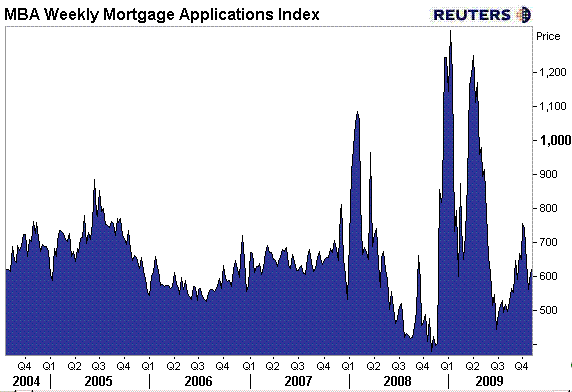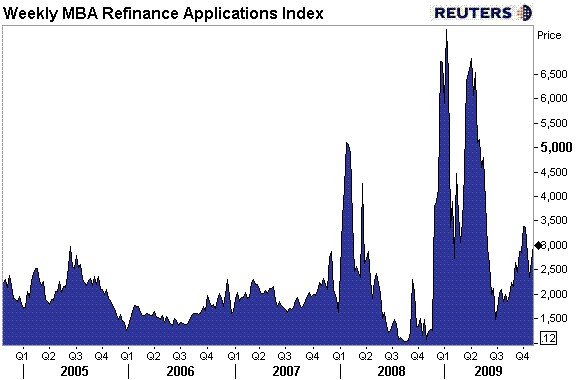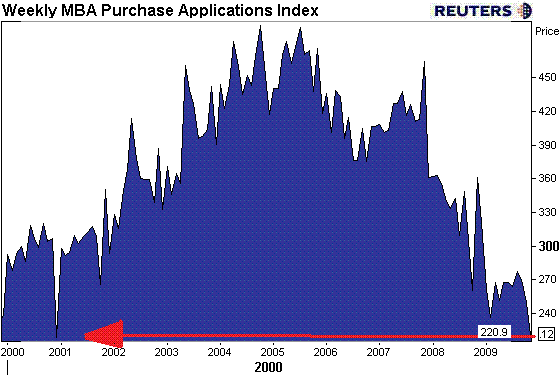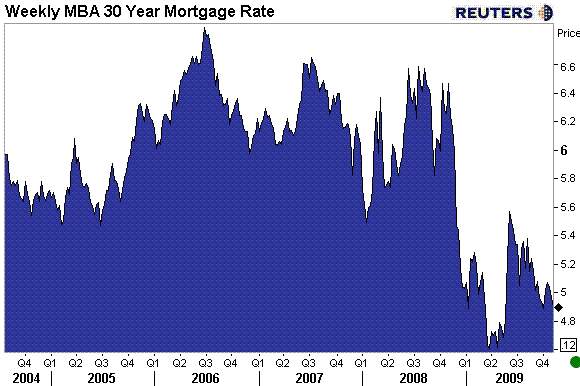The Mortgage Bankers Association today released the Weekly Survey on Mortgage Application Activity for the week ending November 6, 2009.
Housing is a key component of economic forecasts, thus real estate surveys and housing data are closely scrutinized by policy makers.
The Mortgage Banker's application survey covers over 50% of all US residential mortgage loan applications taken by mortgage bankers, commercial banks, and thrifts. The data gives economists a look into consumer demand for mortgage loans. A rising trend of mortgage applications indicates home buying interest is increasing, a positive for the housing industry and economy as a whole. Furthermore, in a low mortgage rate environment, a trend of increased refinance applications implies consumers are seeking out a lower monthly payments which can result in increased disposable income and therefore more money to spend on discretionary items...or just an opportunity to pay down other debts like credit cards and car loans.
In last week's release, which covered new loan applications for the week ending October 30, the MBA reported that demand for new mortgages increased 8.2% and the average 30 year fixed mortgage rates fell from 5.04% to 4.97%. The seasonally adjusted Purchase Index decreased 1.8%. The Refinance Index increased 14.5%. The refinance share of mortgage activity increased to 66.1% of total applications from 62.3% the previous week.
In this week's release, which reports on loan application activity for the week ending November 6, 2009, demand for new mortgage loans increased 3.2% from one week earlier. The 30-year fixed-rate mortgage decreased to 4.90% from 4.97. The Refinance index rose 11.3% while the Purchase index fell 11.7%, its lowest level since December of 2000.
From the Mortgage Banker's Association...
The Market Composite Index, a measure of mortgage loan application volume, increased 3.2 percent on a seasonally adjusted basis from one week earlier. The four week moving average for the seasonally adjusted Market Index is down 4.5 percent.

The Refinance Index increased 11.3 percent from the previous week. The four week moving average is down 3.4 percent for the Refinance Index.The refinance share of mortgage activity increased to 71.5 percent of total applications from 66.1 percent the previous week. This refinance share is the highest share since May of this year, when the 30-year fixed-rate mortgage rate was around 4.7 percent, close to the historical low of the survey.

The seasonally adjusted Purchase Index decreased 11.7 percent from one week earlier. The seasonally adjusted Purchase Index is at its lowest level since December 2000. The unadjusted Purchase Index decreased 13.7 percent compared with the previous week and was 21.6 percent lower than the same week one year ago. The four week moving average is down 6.6 percent for the seasonally adjusted Purchase Index

The average contract interest rate for 30-year fixed-rate mortgages decreased to 4.90 percent from 4.97 percent, with points increasing to 1.03 from 1.01 (including the origination fee) for 80 percent loan-to-value (LTV) ratio loans. The contract rate is the lowest observed in the survey since the week ending May 15th, 2009, when it was 4.69 percent.
The average contract interest rate for 15-year fixed-rate mortgages remained unchanged at 4.33 percent, with points decreasing to 1.15 from 1.33 (including the origination fee) for 80 percent LTV loans.
The average contract interest rate for one-year ARMs increased to 6.85 percent from 6.83 percent, with points decreasing to 0.29 from 0.31 (including the origination fee) for 80 percent LTV loans.








